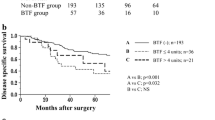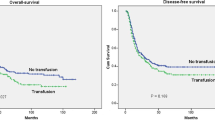Abstract
Background
Perioperative transfusion (POT) is a negative prognostic factor for outcome in cancer patients undergoing surgery, and splenectomy (SPL) has been suggested to help obviate this negative effect. However, the prognostic independence among related factors and clinical significance of the interaction remains elusive.
Patients and methods
Between January 1, 1990 and January 31, 2005, a total of 200 patients with proximal gastric cancer classified as having stage IB to III disease after curative resection were enrolled at Kitasato University Hospital in a retrospective manner, according to a previous report by Weitz et al.
Findings
POT was reconfirmed to be a potent univariate prognostic predictor in this model (p < 0.0001). The tendency was further augmented in patients without SPL, suggesting that SPL can counteract the negative aspects of POT. A multivariate analysis including related factors revealed that POT was one of the most potent independent prognostic factors, as were stage and age. Stratification analysis following the JCGC staging system revealed that the outstanding prognostic difference according to POT was recognized in patients anticipated to be cured, such as those with stage IB (p = 0.012) or II (p = 0.003) but not stage III. SPL could dramatically improve the prognosis with POT in stage IB patients but modestly if at all in those with stage II or III.
Interpretation
Our findings support the need for a clinical alert against POT throughout the course of cancer treatment, especially for curable disease; thus, POT should be carefully considered from an oncologic point of view. Appropriate strategies to minimize POT should be urgently developed.



Similar content being viewed by others
References
Busch OR, Hop WC, Hoynck van Papendrecht MA, et al. (1993) Blood transfusions and prognosis in colorectal cancer. N Engl J Med 328(19):1372–1376
Houbiers JG, Brand A, van de Watering LM, et al. (1994) Randomised controlled trial comparing transfusion of leucocyte-depleted or buffy-coat-depleted blood in surgery for colorectal cancer. Lancet 344(8922):573–578
Lapierre V, Auperin A, Tiberghien P (1998) Transfusion-induced immunomodulation following cancer surgery: fact or fiction? J Natl Cancer Inst 90(8):573–580
Jensen LS, Puho E, Pedersen L, et al. (2005) Long-term survival after colorectal surgery associated with buffy-coat-poor and leucocyte-depleted blood transfusion: a follow-up study. Lancet 365(9460):681–682
Rosenberg SA, Seipp CA, White DE, et al. (1985) Perioperative blood transfusions are associated with increased rates of recurrence and decreased survival in patients with high-grade soft-tissue sarcomas of the extremities. J Clin Oncol 3(5):698–709
Fong Y, Karpeh M, Mayer K, et al. (1994) Association of perioperative transfusion with poor outcome in resection of gastric adenocarcinoma. Am J Surg 167:256–260
Maeta M, Shimizu N, Oka A, et al. (1994) Perioperative allogeneic blood transfusion exacerbates surgical stress-induced postoperative immunosuppression and has a negative effect on prognosis in petients with gastric cancer. J Surg Oncol 55:149–153
Hyung WJ, Noh SH, Shin DW, et al. (2002) Adverse effects of perioperative transfusion on patients with stage III and IV gastric cancer. Ann Surg Oncol 9(1):5–12
Weitz J, D’Angelica M, Gonen M, et al. (2003) Interaction of splenectomy and perioperative blood transfusions on prognosis of patients with proximal gastric and gastroesophageal junction cancer. J Clin Oncol 21(24):4597–4603
Nio Y, Tsubono M, Kawabata K, et al. (1993) Comparison of survival curves of gastric cancer patients after surgery according to the UICC stage classification and the General Rules for Gastric Cancer Study by the Japanese Research Society for gastric cancer. Ann Surg 218(1):47–53
Ikeguchi M, Murakami D, Kanaji S, et al. (2004) Lymph node metastasis of gastric cancer: comparison of Union International Contra Cancer and Japanese systems. ANZ J Surg 74(10):852–854
Nio Y, Yamasawa K, Yamaguchi K, et al. (2003) Problems in the N-classification of the new 1997 UICC TNM stage classification for gastric cancer: an analysis over 10 years’ outcome of Japanese patients. Anticancer Res 23(1B):697–705
Kaplan EL, Meier P (1958) Nonparametric estimation from incomplete observations. J Am Stat Assoc 1958;53:457–481
Cox DR (1972) Regression models and life-tables. J R Stat Soc (B) 34:187–220
Al-Mehdi AB, Tozawa K, Fisher AB, et al. (2000) Intravascular origin of metastasis from the proliferation of endothelium-attached tumor cells: a new model for metastasis. Nat Med 6(1):100–102
Bohlius J, Langensiepen S, Schwarzer G, et al. (2005) Recombinant human erythropoietin and overall survival in cancer patients: results of a comprehensive meta-analysis. J Natl Cancer Inst 97(7):489–498
Miller CB, Platanias LC, Mills SR, et al. (1992) Phase I-II trial of erythropoietin in the treatment of cisplatin-associated anemia. J Natl Cancer Inst 98–103
Case DC Jr, Bukowski RM, Carey RW, et al. (1993) Recombinant human erythropoietin therapy for anemic cancer patients on combination chemotherapy. J Natl Cancer Inst 85(10):801–806
Seidenfeld J, Piper M, Flamm C, et al. (2001) Epoetin treatment of anemia associated with cancer therapy: a systemic review and meta-analysis of controlled clinical trials. J Natl Cancer Inst 93(16):1204–1214
Vansteenkiste J, Pirker R, Massuti B, et al. (2002) Double-blind, placebo-controlled, randamized phase III trial of darbepoietin alfa in lung cancer patients receiving chemotherapy. J Natl Cancer Inst 94(16):1211–1220
Cella D, Zagari MJ, Vandoros C, et al. (2003) Epoetin alfa treatment results in clinically significant improvements in quality of life in anemic cancer patients when referenced to the general population. J Clin Oncol 21(2):366–373
Witzig TE, Silberstein PT, Loprinzi CL, et al. (2005) Phase III, randomized, double-blind study of epoetin alfa compared with placebo in anemic patients receiving chemotherapy. J Clin Oncol 23(12):2606–2617
Chang J, Couture F, Young S, et al. (2005) Weekly epoietin alfa maintains hemoglobin, improves quality of life, and reduces transfusion in breast cancer patients receiving chemotherapy. J Clin Oncol 23(12):2597–2605
Steensma DP, Molina R, Sloan JA, et al. (2006) Phase III study of two different dosing schedules of erythropoietin in anemic patients with cancer. J Clin Oncol 24(7):1079–1089
Glaspy J, Vadhan-Raj S, Patel R, et al. (2006) Randamized comparison of every-2-week darbepoietin alfa and weekly epoietin alfa for the treatment of chemotherapy-induced anemia: the 20030125 Study Group Trial. J Clin Oncol 24(15):2290–2297
Bohlius J, Wilson J, Seidenfeld J, et al. (2006) Recombinant human erythropoietins and cancer patients: updated meta-analysis of 57 studies including 9353 patients. J Natl Cancer Inst 98(10):708–714
Author information
Authors and Affiliations
Corresponding author
Rights and permissions
About this article
Cite this article
Yamashita, K., Sakuramoto, S., Kikuchi, S. et al. Transfusion Alert for Patients with Curable Cancer. World J Surg 31, 2315–2322 (2007). https://doi.org/10.1007/s00268-007-9237-6
Published:
Issue Date:
DOI: https://doi.org/10.1007/s00268-007-9237-6




